- Home
- Hilary Mantel
Every Day Is Mother's Day Page 3
Every Day Is Mother's Day Read online
Page 3
That morning Evelyn had shouted questions at her. Evelyn had taken by the arm and shaken the girl known as Muriel Alexandra Axon. Whenever this happens, Muriel creeps out, a midnight flitter; she watches from the other side of the room. Evelyn thinks she knows who she is talking to; she does not know that she is shaking a table or a floor, a dead planet, a pebble on a beach. It is most satisfactory. It shows how little Evelyn knows of the true state of affairs.
Once, some years ago now, Muriel realised that her mother could not read her mind, or not all of it. She tested this. She thought certain thoughts, like: I will kill you. Then many times a day Muriel would think thoughts, rejoicing in the deception. I will trip you down the stairs and break your neck. Mother mother mother. Muriel eat your soup spilling it like that. Clumsy girl. From thoughts, short steps to action. Evelyn did not know that she had walked along Lauderdale Road, that she had a bone in her pocket, or five coins from the tea-money. Unless…still, Muriel was not sure how much she knew. This was why, when Evelyn spoke to her, she became like an empty cavern. Muriel Alexandra’s body stands irreproachable like a guardsman on parade, while her thoughts slip off to gambol and strut, enjoying their own existence. GO NOT TO THE KITCHIN TODAY.
Evelyn explains. They go into the front parlour, and drink the cordial with the lukewarm water. Tomorrow, Evelyn thinks, if there is no message, I must remember to fill the jug. Or I could take it upstairs, and fill it in the bathroom.
Muriel remarks that the orange juice is very nice. Evelyn says kindly, “You are a good girl, you appreciate what is provided for you.”
And again Muriel smiles. The orange juice is revolting; she thinks so. She marvels constantly at how easy it is to deceive. She wants one of the tins of meat; all evening she cherishes her longings and her hunger, the feelings she has that Evelyn does not know about. At eight o’clock Evelyn says, “We could have a tin of meat.”
Inside, Muriel squirms in pain. Her thought has been read again. Dragged, filleted, out of her living head. But she struggles to keep the smile on her face; and Evelyn thinks she is pleased at the suggestion. Muriel is beginning to feel the victor; she can keep changing the rules, Evelyn cannot win. Unless…still, it might be possible that she is Evelyn. That Evelyn is growing inside her. Go, go, she thought savagely; I did not invite you here.
Nine o’clock; Evelyn nods in her chair. She is growing deaf, Muriel thinks, old and deaf. Stealthily she moves out to the hallway. It is not until Friday morning that Evelyn goes through her pockets. First she takes the money, spreading it out on her palm; five, five pieces of money. Then the letter in its brown wrapper. Where? She looks around. Her mouth twists. She puts her hand to it in alarm. That was Evelyn’s mouth twisting, Evelyn growing inside her.
In panic she spreads out the money and counts it again; five. And there is the dead plant, all its leaves gone now, nothing but the brown withered stalk, standing in a basket made by a person they have taken to be Muriel Alexandra Axon. Carefully she lifts out the plantpot; folding the letter in half, she places it in the bottom of the basket. (And you be sure you give it to your mother, won’t you now, Muriel?) Back goes the plant. She takes the bone. It is still slimy from the jaws of the dog called pedigree wire-haired fox terrier. Outside the door of the front parlour she listens. Only Evelyn’s breathing; she snickers in her nose, her lower jaw droops onto her chest. Muriel enters the kitchen. There is the teapot from this morning, the breakfast toast, all the remains from before Evelyn received her message from the spirits. Muriel picks up the box of matches, selecting carefully the one that will do the job. From the drawer she takes three tea-towels; white and blue check, white and yellow check, sights of Southport. She puts them in the sink to burn them. The first match goes out, and the second. But she has seen a man, when he lights his cigarettes, shielding the flame with his hand. She takes pleasure in the fact that no one will ever know where she learned this trick. In time she can throw the charred debris on the floor, surrounding the bone. And the pedigree wire-haired fox terrier will never complain, she knows that; when she walks along the Avenue again, she will see the resentment locked in its yellow eyes, and the dumb unproductive movements of its jaw.
Evelyn wakes with a start at Muriel’s hand on her shoulder. “Yes, yes,” she mutters, “it’s time we were getting to bed.” She takes up the poker which she always carries with her when she moves about the house after dark. All the lights will be left burning tonight; that is the least discouragement one can give them, she tells Muriel. Muriel mounts the stairs behind her. Muriel’s shoulders droop. Her knees stiffen, her hand quivers for support on the banister. At each tread she feels pain, she grimaces, she gasps a little. All her resources for today are played out. She is becoming Evelyn, for the night.
Department of Social Services
Wilberforce House
1st May, 1974
Dear Mr. Byrne,
You will be pleased to know that we have persuaded Tarleton’s Hardware not to press shoplifting charges against Miss Muriel Axon, regarding the removal of a tin-opener which occurred when a small party of clients was taken on a shopping expedition last week.
Fortunately Mr. Tarleton was most reasonable when the situation was explained to him. However we cannot count on meeting this forbearance from shopkeepers on other occasions. I should therefore be obliged if you would request your staff to exercise great vigilance when taking clients out of the Day Centre grounds. This type of incident, if publicised, can have a very unfortunate effect on public relations between the department and the public.
The caseworker involved here tells me it would be unwise to let Miss Axon’s mother know of this incident, as she appears to be a woman of exceedingly old-fashioned moral values and her already extremely negative attitude to Miss Axon is compounding our difficulties in this case.
I should also be obliged if you would not mention this to the nursing or other care staff.
Sincerely,
SUZANNE CLEGG
Principal Social Worker
Dear Sister Janet,
This is just to tell you that Muriel got let off the bit of thieving she did when Mpoe took them out the other week to have their autonomy. I know because I heard M. S. Byrne MA bawling Mpoe out for not keeping her eyes open when they came out of the Chocolate Kabin, I think he’s had a rocket from Clegg. What the devil do you think she wanted a tin-opener for? Between you and me I wouldn’t mind if we could lose Muriel when we get demolished.
Love,
NORAH
And Thursday.
“This day last week some beast was murdered in the kitchen,” Evelyn said. Oh, can they die, Muriel asks. Evelyn tries, without much hope, once more to explain to Muriel. There is more than one set of persecutors. There are the tenants with their constant jibes, their petty destructiveness; it was not (she pats her daughter’s arm) a human creature. It is possible to see them, quite possible, but they are very quick. You must learn to look for them out of the corner of your eyes. If people did learn to look out of the corners of their eyes, they would see a great deal that at present they miss; and most of it would be to their disadvantage.
But the other inhabitants, their effect is more—she presses her hand to her rib cage. In the soul, she wants to say, but she wonders if Muriel has a soul; if she had, and they took it away. I fear…her seamed face works a little in distress at her thoughts. She makes a gesture like someone erasing the writing on a blackboard; after which, the board itself remains.
She looks different, Muriel notices, more harassed, more starting and looking in corners. Since last Friday’s discoveries.
She is fumbling in her purse now. She lays out certain coins on the kitchen table.
“For your tea and biscuits,” she says.
Muriel lets them lie for a time. She practises fixing her eyes on Evelyn but looking straight through her to the wood of the cupboard at her back. She practises wiping all thoughts out of her mind. At the same time she must watch Evelyn, to see that she
is still mumbling over her own concerns, not looking up with the comprehension she dreads. Finally, when Muriel can bear the suspense no longer, she snatches up the coins and holds them in her hands. Evelyn lays out more on the table. “For the milk-money. Tomorrow.” Evelyn shuffles out of the kitchen, but in a moment she is back. “My envelopes,” she says, her voice querulous. “My white envelopes for putting in the milkbottles. They have torn them all.” She opens the kitchen drawer where she keeps her ration books and ends of string, her paper bags and cotton reels and farthings.
“Lock and key,” she says. “I shall have to buy more and keep them under lock and key.”
She tears the corner of a paper bag and puts the money into it. She folds the remainder of the bag and puts it back in the drawer. Once again tomorrow he will take the money and go away, without having to knock at the door; when the price goes up he will put a note through the letterbox. They have teased her so often with their rappings that she tries not to go to the door for any unnecessary reason; tries not to set the precedent of being in a certain place at a certain time, in case they set traps. Suddenly vindictive, she turns to Muriel: “I think of stopping you going to these Handicapped Classes. What good does it do? I think of stopping you.” In a monotone, Muriel begins to repeat her words. “Stop it, stop it,” Evelyn screams at her. There is terror in the girl’s face. Evelyn waddles from the room.
And once more: the match rasps against the box, the flame wavers up; Muriel watches her flesh shrinking away from the heat, and feels pain. She allows the flame to play over her wrist until it burns out in her fingers. Feels, feels. Taking the scissors, uses the point to draw blood. Again, feels.
“If you’re going, if you’re going at all, it’s time you got ready. Are you listening to me?”
Muriel sits with her arms clamped down to her sides, willing her mother to turn. The blisters are forming now on her raw skin, the blood has dried. Evelyn shows no signs of recent pain.
“Here.” Evelyn goes to the chest of drawers and impatiently wrenches one open, tossing a cardigan and a pair of thick woollen stockings onto the bed. Her water-eyes darting, Muriel sees that Evelyn’s forearms are unmarked. So however it came about that her thoughts were read again (as good as read), even if half an hour ago Evelyn was thinking in her brain, she has not been in all parts of her today. Still, unless…unless the marks will show up later. Evelyn turns, and sees only her daughter’s shuttered face with its habitually blank gaze. She begins again to grumble about the trouble it gives her, getting Muriel ready for the class and setting her going. Only the thought of the Welfare people coming to the house stops her from keeping Muriel at home. “What do you want to go there for anyway? Going on a bus with a lot of other people with things wrong with them, cripples and people not right in the head. One day they’ll put them on that bus and take them and gas them, and then you’ll wish you’d stayed at home with your mother.” She knows Muriel is not listening to her. She is looking sceptically at the clothes on the bed. She goes to her drawers and hunts through for the pink fluffy cardigan.
“Grey with dirt,” Evelyn says contemptuously. “If you won’t give it to me to wash I won’t let you wear it again after this week. They will suppose I don’t see to your cleanliness.”
She gapes. Her jaw unhinges and her eyes grow round. Muriel is not in any doubt now. Evelyn has not been in her body today, not even very much in her brain. She is completely surprised, Muriel thinks. To be helpful, always to be helpful, she holds up her arms for Evelyn’s inspection. A low moan comes from Evelyn.
“They have been torturing you,” she says. “They have been here in your room, torturing you.” Moaning again, she washes her arthritic hands together. Could you not cry out? You have gagged me, Muriel thinks. Up the stairs you would have come, rushing to take my pain for yourself. With what? Sharp blades and fire, Muriel says, in her casually dead voice. Now Evelyn is smashing her way out of the room and along the landing, quite heedless of the usual mockery as she passes the door of the spare room, and Muriel can hear her retching behind the closed bathroom door. Putting her hand to her belly, Muriel feels a little wash of the sickness to come.
Now Lauderdale Road, homecoming. Screened by the high bushes, Muriel takes out her coins to count them. Some of them have gone. Spent, she thinks dully, expended. What are these heads, she wonders, whose are these heads upon them? She slips a hand in her pocket and takes out the little looking-glass that she picked up from where it was lying on a counter in a shop. She presses the sides of her skull, to keep in her memory the places she has seen.
Evelyn drives questions into her like hooks. Did they see, did they remark upon your arms, what people were there, were there baskets made at that place, was there singing of songs, of what type and number, kind and shape, were the biscuits you ate? Of the tea, was it pale or brown, is there sugar in that tea, do they give you the sugar as you are accustomed, in lumps or spoons from basins, and do they place it there for you or do you yourself take what you suppose you need? Of the singing: is there piano or other instrument to accompany it? She knows nothing, Muriel thinks with contempt. She makes her face frozen up.
“Oh, you are stonewalling again,” Evelyn says furiously. That night when she enters her room she will find it almost festal, the pieces of the torn envelopes littering the carpet and sibilating in the draughts, like confetti.
Department of Social Services
Wilberforce House
3rd May 1974
Dear Mrs. Axon,
This is to advise you that the Daycare Sessions attended by Miss Axon will be temporarily suspended for a short period only, due to the demolition of the premises in Calderwell Road, from the Thursday after next. However our sessions are to be resumed at a much better equipped centre at The Hollies, Vernon Road, and you will be advised presently of the new arrangements for transport and etc. If you have any enquiries please contact Miss J. Smith at the address above or telephone.
Yours sincerely,
M. CARTWRIGHT
Social Work Assistant
p.p. Director of Social Services
If they had not been pushing her about that morning, if they had not been trying to do her bodily injury, she would not have smashed the plantpot or found the letter underneath, in the bottom of the basket.
This is old, she said to herself. It has been here for some time. This was May, it is now late June, therefore certainly there have been Thursdays when…there was time unaccounted for. Yet time in the house was moving now at its own speed, in fits and starts. Food decayed on the plates, insects bred in the dark. The place was more and more crowded. Useless to try to talk to Muriel, to ask her for some account of the letter. Muriel rarely spoke now; it was like going back to her childhood. More and more, when Evelyn was in a room with her daughter, she felt as if no one was there.
Department of Social Services
Wilberforce House
3rd July 1974
Dear Mrs. Axon,
Mrs. J. Smith visited your home on behalf of the Department last Friday, but was unable to gain admittance. The reason for her visit was to ascertain whether Miss Axon had been informed of the new arrangements for attendance at The Hollies, since she has not been present at Daycare Sessions since they resumed. If Miss Axon is ill, perhaps you would be kind enough to notify us, and let us know when she will resume attendance. If you have any problems, please don’t hesitate to contact us.
Jacqueline Smith is now on maternity leave, and I shall be dealing with Miss Axon’s case in future.
Yours sincerely,
CAROL TAFT
At first, Evelyn had said, “Perhaps you need not go to this new place. They won’t want you. They are always saying there is pressure on their faculties.” She was afraid that they would call, and when the knocking did come, at an unaccustomed time of day, she had taken Muriel into the back room and made her sit quietly until the caller had gone away. That morning she had not felt like seeing anyone, combating them, dealing
with anyone at all. It had been enough of a shock to find that morning’s trail of messages. First the little mirror that she had never seen before lying on the hall table, a tawdry affair of pink plastic, and the twist of papers round it with the insect capitals: LOOK AT YOUR FASE.
Then she had hunted them through the house: THERE ARE MANY PEOPLE IN THIS PLASE and YOU ARE PUTING IN MY PLASE and SHE SHALL BE PUT IN HER PLASE and, last of all, ANOTHER IS IN HER PLASE.
The day she received the second letter from the Welfare had been much calmer. There had been no messages lately, no buffetings on the landing and stairs, no thefts of her property. It had been Muriel’s problem that was uppermost in her mind; or Muriel’s condition rather. She strove to keep it in perspective. The invention and ingenuity of the parallel world had amazed her in recent months, its many and new manifestations, the closeness of its stinking breath on her neck. Periods of calm followed by new alarms, the torturing of Muriel, the closing off to both of them, permanently now, of certain parts of the house. In the circumstances, Muriel’s pregnancy could only be felt as a lesser shock.
“Both mad, if you ask me,” Florence Sidney was saying. “You might as well try to fly through the window as help either of them.”
She was standing by the window, which had perhaps helped to indicate the improbability to her mind; she was looking out at her nephew and her nieces, playing among the windfalls in the disarrayed late summer garden. “I haven’t seen Muriel for—” She turned her head. It was painfully evident that her sister-in-law was not listening to her. Sylvia was launched on a series of questions.
“And may I ask what you intend to do with yourself now?”
“Do now? Well.” The questions seemed to make no sense. What does anyone do now?
“With your life. With the rest of your life. That’s what I’m talking about, Florence.”
“Well, I’ll do the same as everybody,” Florence said. Limp on, eyes front, towards the grave.

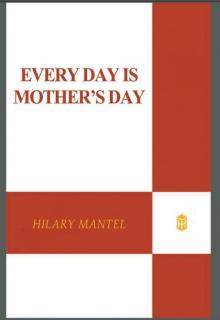 Every Day Is Mother's Day
Every Day Is Mother's Day An Experiment in Love
An Experiment in Love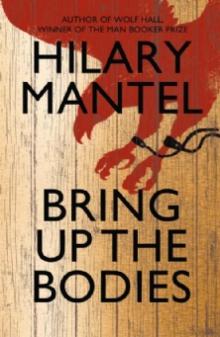 Wolf Hall
Wolf Hall A Place of Greater Safety
A Place of Greater Safety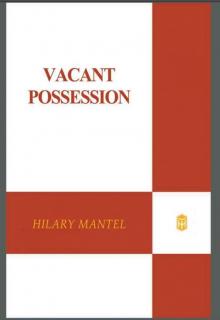 Vacant Possession
Vacant Possession The Giant, O'Brien
The Giant, O'Brien Beyond Black
Beyond Black Ink in the Blood: A Hospital Diary
Ink in the Blood: A Hospital Diary The School of English
The School of English Giving Up the Ghost
Giving Up the Ghost The Mirror and the Light: 2020’s highly anticipated conclusion to the best selling, award winning Wolf Hall series (The Wolf Hall Trilogy, Book 3)
The Mirror and the Light: 2020’s highly anticipated conclusion to the best selling, award winning Wolf Hall series (The Wolf Hall Trilogy, Book 3) Fludd
Fludd Eight Months on Ghazzah Street
Eight Months on Ghazzah Street Learning to Talk
Learning to Talk How Shall I Know You?: A Short Story
How Shall I Know You?: A Short Story A Change of Climate
A Change of Climate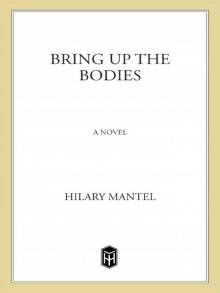 Bring Up the Bodies
Bring Up the Bodies The Assassination of Margaret Thatcher: Stories
The Assassination of Margaret Thatcher: Stories Beyond Black: A Novel
Beyond Black: A Novel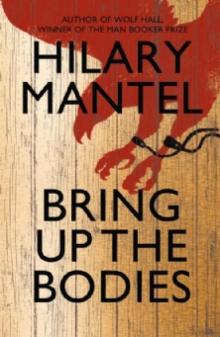 Wolf Hall: Bring Up the Bodies
Wolf Hall: Bring Up the Bodies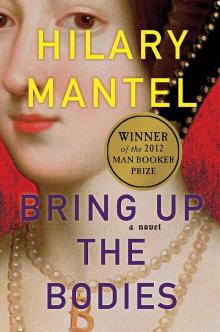 Bring Up the Bodies tct-2
Bring Up the Bodies tct-2 Ink in the Blood
Ink in the Blood The Assassination of Margaret Thatcher
The Assassination of Margaret Thatcher Eight Months on Ghazzah Street: A Novel
Eight Months on Ghazzah Street: A Novel How Shall I Know You?
How Shall I Know You? A Change of Climate: A Novel
A Change of Climate: A Novel The Giant, O'Brien: A Novel
The Giant, O'Brien: A Novel Fludd: A Novel
Fludd: A Novel A Place of Greater Safety: A Novel
A Place of Greater Safety: A Novel An Experiment in Love: A Novel
An Experiment in Love: A Novel